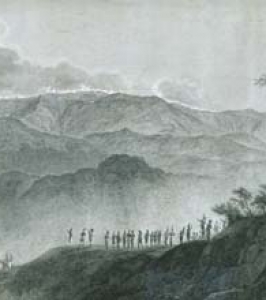1796–1805
On 9 March 1796, Napoleon Bonaparte marries Joséphine de Beauharnais, the widow of an official guillotined during the war. Just two days later, he leaves for the Italian Campaign. It should have been a simple diversionary operation in the war against Austria, but, thanks to the extraordinary military tactics of the future emperor, it ends in the triumphal and unstoppable conquest of northern Italy, constraining the Austrians to the Treaty of Campo formio.
In 1798, the French send the young general, by now far too popular in his homeland, to conquer Egypt. The undertaking ends with defeat in the naval battle of Aboukir Bay, due to Sir Horatio Nelson, but it is remembered above all for Napoleon’s decision to bring to Egypt a sizeable company of scholars from various disciplines, who once there compile a report of more than 7000 pages and discover, among other things, the Rosetta Stone.
At Napoleon’s re–entry in France, welcomed as the man who could take control of a situation by now close to chaos, he puts an end to the period of the French Revolution with a coup on 18 Brumaire (9 November) 1799 and takes power as First Consul within an executive consular commission composed of himself, Roger Ducos and Emmanule Joseph Sieyès. Napoleon immediately retakes control of Italy and recuperates relations with the Papal State and England, at the same time setting himself to the complete revision of the French legal system, which culminates on 21 March 1804 with the entering into force of the Napoleonic Code. In the same year, on 2 December, the consulate period ends with Napoleon crowning himself, in the presence of Pope Pius VII, Emperor of France, then crowning his wife Joséphine Empress immediately after.
1796. The battles of Montenotte, Cosseria, Millesimo and Dego, in the province of Savona, signal a fundamental phase in the conquest of Northern Italy by the French headed by Napoleon, newly nominated general.
1797. Élisa Bonaparte, Napoleon’s sister, marries the Corsican captain Felice Baciocchi.
1797. Sarzana becomes part of the Department of the Gulf of Venus, with its capital in La Spezia, within the Ligurian Republic annexed to the First French Empire.
1801. At the signing of the Agreement with the Catholic Church, Joseph Fesch, Napoleon’s maternal uncle, re–enters the Church and in the span of two years becomes first archbishop of Lyon and then cardinal of San Lorenzo in Lucina.
1805. Napoleon constitutes the Principality of Lucca and Piombino, assigning it to his sister Élisa Bonaparte Baciocchi and her husband, Felice Baciocchi.










